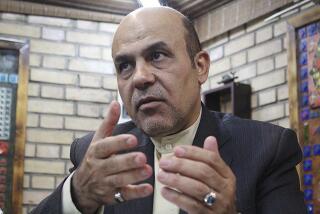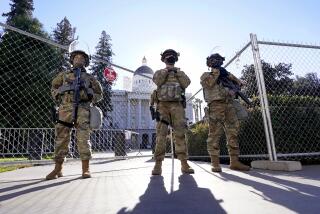Officers Testify GI Who Killed 2 Soldiers Was Not Fit for Duty
- Share via
FT. BRAGG, N.C. — Army officers and other military personnel who supervised Sgt. Hasan Akbar told a sentencing hearing Wednesday that he was unfit for duty and indicated that he never should have been sent to the Middle East, citing what they described as his bizarre behavior.
Akbar, 34, was found guilty last week of two counts of premeditated murder in the deaths of two U.S. officers, plus three counts of attempted murder.
A 15-member military jury will decide if he is to be sentenced to death, life imprisonment with no possibility of parole or life imprisonment with the possibility of parole.
Akbar plans to take the witness stand today and make an unsworn statement, a procedure under military law that allows him to address the jury without being cross-examined by prosecutors. It will mark his first public statement since the grenade and rifle attack in Kuwait two years ago.
The jury will then begin deliberating.
Akbar’s lawyers, who are arguing for a life sentence, offered testimony Wednesday about his shortcomings as a soldier and contended that the command staff never should have sent him to the Middle East.
Testimony during his court-martial and in a pretrial hearing showed that Akbar suffered from sleep deprivation and often acted erratically, pacing alone and talking to himself for long periods of time.
Akbar, a Muslim raised in South Los Angeles, has maintained that he felt harassed by slurs against Islam made by soldiers after the Sept. 11 attacks, and again as they prepared to deploy to the Middle East. He has said that he feared American soldiers would rape and kill Muslim women once Iraq was defeated.
Government lawyers maintain that Akbar was cold and calculating; they showed the jury copies of computer entries in which he planned the assault.
Early on March 23, 2003, Akbar shut off the lights at the officers’ campground in Kuwait, tossed grenades into their tents and fired at them as they ran outside.
Army Capt. Christopher Seifert, 27, was fatally shot in the back as he fled. Air Force Maj. Gregory Stone, 40, died of wounds caused by 83 pieces of grenade shrapnel.
In testimony Wednesday, Army Capt. David Storch, a platoon leader in Akbar’s engineering unit, described Akbar as repeatedly unreliable, even to the point of showing up for work at Ft. Campbell, Ky., on Sept. 11, 2001, without identification.
Storch said Akbar was a poor leader who once allowed subordinates to dump hazardous materials under a bridge. Another time, Storch said, Akbar showed up for training exercises at Ft. Polk, La., without his duffel bag.
Storch said Akbar, who joined the military in 1998, a year after graduating from UC Davis with two engineering degrees, “never improved” and actually “degraded.”
He was counseled about his performance and eventually was transferred out of the headquarters platoon.
“He got a very mediocre, lukewarm evaluation,” Storch said. “He met the standard, but he certainly wasn’t ready to be a squad leader.”
Despite Akbar’s behavior, Storch said, no Army commanders tried to have him removed from the service.
Army Sgt. Daniel Kumm said Akbar was “below average in competence and general soldierly skills” and was “not someone you would want to take across the berm with you into Iraq.”
But, Kumm said, “Until he proved himself a hazard, I wasn’t going to target him.” Kumm acknowledged that no one in the command staff stepped in and ordered Akbar to remain behind.
In Kuwait, Kumm said, soldiers complained that Akbar suffered from sleep apnea and paced at night. Kumm said he talked to Akbar about those problems several days before the attack, and considered him to be all right. Otherwise, Kumm said, “I would have sent him to the chaplain and mental health to be evaluated.”
Kumm said he heard soldiers expressing slurs against Muslims, but none specifically directed toward Akbar.
“Usually it was soldiers talking about the enemy,” he said. “It was depersonalizing the enemy. If I took it as disparaging to a member of the unit, I would have corrected it.”
The jury also heard from Dan Duncan, Akbar’s physics teacher at Locke High School in Los Angeles. Although the school had a very high dropout rate, Duncan said, Akbar “was an excellent student.... I’d put him in the top five or 10 kids I had there. He had an aptitude and showed an interest.”
Akbar’s role in the attack was “something I never would have expected,” Duncan said.
More to Read
Sign up for Essential California
The most important California stories and recommendations in your inbox every morning.
You may occasionally receive promotional content from the Los Angeles Times.














